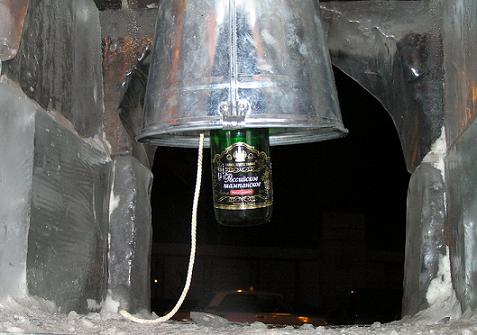«С праздником!» or: How to Congratulate Russian Style Posted by josefina on Nov 5, 2009 in Culture, History, language, Soviet Union
Yesterday was the 4th of November and «выходной день в России» [a day of rest, day off, holiday in Russia]. Yes once again it was time to celebrate the mysterious «День народного единства» [(People’s) Unity Day]. There’s no need to pretend that Russians don’t look at this strange holiday in pretty much the same way, since they don’t and in this confusion we can finally meet and truly understand each other. Most Russians don’t even know «почему» [why] this day is celebrated in the country today. Some people – including me since it was during my first year in Russia and humans have a tendency to remember the first year much more than we remember what happened in the following five – have a fuzzy memory of that the day off used to be called something like «день примирения» [Reconciliation Day]. The first time I celebrated this Russian holiday was «в Санкт-Петербурге» [in Saint Petersburg] in 2004 and back then it was still celebrated on the 7th of November and since then I have commented on this experience by using the following words: «я примирилась так, что голова после этого болела три дня» [I reconciled so much that my head hurt for three days afterwards]. In the Soviet Union the 7th of November marked the «годовщина Октябрской революции» [anniversary of the October Revolution]. Some Russians claim that they as a people have just got too used to having a day off in November, and that’s why they had to come up with any kind of excuse to keep it. The 4th of November is today known as «день освобождения от польско-литовских и шведских оккупантов» [the day of liberation from Polish, Lithuanian and Swedish occupants]. Perhaps because of this I have no real reason to celebrate this day (I am, after all, Swedish), even though I tried very hard to make it a special day last year.

No Russian «праздник» [day of celebration, holiday] without «шампанское» [champagne]! If you’re unsure as to what to do with your bottle after you’ve drunk it all together with your best friend «Ваня» [short for «Иван»] out on the street in minus 30, then here’s a tip…
Let’s take today to focus on not HOW to celebrate holidays with Russians (since I’m fully sure everyone already has expertise in this area), but HOW to congratulate Russian with their holidays! We’ll start with the simplest way:
«С праздником!» – Happy Holiday!
Usually you don’t say the whole phrase in Russian when congratulating someone: «Поздравляю вас/тебя с праздником!» – [I congratulate you with the holiday!]
«поздравлять» (impfv.) and «поздравить» (pfv.) – [to congratulate, felicitate; compliment, hail] is always combined with a direct object in accusative: «кого?» [whom?] and an indirect object in the instrumental case: «с чем?» [with what?]. Here are a few examples:
«Надо поздравить Фёдора Михайловича с защитой докторской диссертации!» – [(We) must congratulate Fyodor Mikhailovich with having defended his doctoral dissertation!]
«Я уже поздравила маму с Международным женским днём» – [I have already congratulated my mom with International Women’s Day (8th of March)].
«Поздравляю вас с Новым Годом!» – [(lit.: ‘I congratulate you with the New Year!’) Happy New Year!]
«Поздравляют ли друг друга с Рождеством в России?» – [Do people in Russia wish each other Merry Christmas?]
«Конечно, поздравляют! Но только седьмое января, а не двадцатпятое декабря» – [Of course they congratulate! But on the 7th of January, not on the 25th of December].
Among other important words to know in the same context are the noun «праздник» [holiday, day of celebration] and the verb «праздновать» [celebrate, feast; keep; rejoice; solemnize]. This verb is combined with a direct object in accusative: «праздновать что?» [to celebrate what?] and «праздновать кого?» [to celebrate whom?].
«Как ты обычно празднуешь свой день рождения?» – [How do you usually celebrate your birthday?]
«Завтра будем праздновать Лену, поздравим её с рождением ребёнка!» – [Tomorrow we will celebrate Lena; we’ll congratulate her with the birth of her baby!]
From this verb and this noun two very different adjectives exist, and it is important that you try to keep them apart as their meaning is not the same. Though they may look and sound very similar:
«праздничный» means festive, merry, like a feast or festival, while
«праздный» means idle, unoccupied; indolent; vacuous.
That’s all from the Ural Mountains for now. «С праздником всех!» [Happy Holiday everyone!]

Build vocabulary, practice pronunciation, and more with Transparent Language Online. Available anytime, anywhere, on any device.




Comments:
Svetlana:
Hi, Josefina,
I just wanted to tell you that we [Russians] do not say «праздновать кого?» – only «праздновать что?».
Therefore, «Завтра будем праздновать Лену, поздравим её с рождением ребёнка!» also contains a mistake – it is impossible to celebrate someone in Russian.
Josefina:
Hi Svetlana!
Thank you so much! I did not know this, and as it turns out I have been doing this mistake for years… And no Russian has ever told me that this is wrong! But now I know. Русские не празднуют друг друга, а только праздники 🙂 Спасибо!
Jenny:
Hello, Josephina!
Russian is my native language, so I’ve found the mistake in your article. In the phrase “«Конечно, поздравляют! Но только седьмое января, а не двадцатпятое декабря» – [Of course they congratulate! But on the 7th of January, not on the 25th of December].” you’ve made a mistake in using numerals “седьмое” and “двадцатпятое”. Here the should be used as “седьмого” and “двадцатпятого”. The ending “го” means the same as the ending “th”.
Svetlana:
Jenny,
I thought it was just a misprint, but if we correct it, then it should be “Конечно, поздравляют! Но только седьмого января, а не двадцать пятого декабря”.
In Russian 25 is “двадцать пять” 🙂
Sorry 🙂
Jenny:
Surely! You’re right!